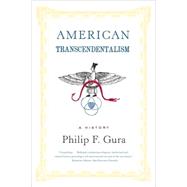American Transcendentalism A History
, by Gura, Philip F.- ISBN: 9780809016440 | 0809016443
- Cover: Paperback
- Copyright: 9/2/2008
American Transcendentalismis a sweeping narrative history of America's first group of public intellectuals, the men and women who defined American literature and indelibly marked American reform in the decades before and following the American Civil War. Philip F. Gura masterfully traces their intellectual genealogy to transatlantic religious and philosophical ideas, illustrating how these informed the fierce theological debates that, so often first in Massachusetts and eventually throughout America, gave rise to practical, personal, and quixotic attempts to improve, even perfect the world. The transcendentalists would painfully bifurcate over what could be attained and how, one half epitomized by Ralph Waldo Emerson and stressing self-reliant individualism, the other by Orestes Brownson, George Ripley, and Theodore Parker, emphasizing commitment to the larger social good. By the 1850s, transcendentalists turned ever more exclusively to abolition, and by war's end transcendentalism had become identified exclusively with Emersonian self-reliance, congruent with the national ethos of political liberalism and market capitalism. Philip F. Gurais William S. Newman Distinguished Professor of American Literature and Culture at the University of North Carolina, Chapel Hill, where he holds appointments in English, American studies, and religious studies. A National Book Critics Circle Award Finalist American Transcendentalismis a comprehensive narrative history of America's first group of public intellectuals, the men and women who defined American literature and indelibly marked American reform in the decades before and following the American Civil War. Philip F. Gura traces their intellectual genealogy to transatlantic religious and philosophical ideas, illustrating how these informed the fierce local theological debates that, so often first in Massachusetts and eventually throughout America, gave rise to practical, personal, and quixotic attempts to improve, even perfect the world. The transcendentalists would painfully bifurcate over what could be attained and how, one half epitomized by Ralph Waldo Emerson and stressing self-reliant individualism, the other by Orestes Brownson, George Ripley, and Theodore Parker, emphasizing commitment to the larger social good. By the 1850s, the uniquely American problem of slavery dissolved differences as transcendentalists turned ever more exclusively to abolition. Along with their early inheritance from European Romanticism, America's transcendentalists abandoned their interest in general humanitarian reform. By war's end, transcendentalism had become identified exclusively with Emersonian self-reliance, congruent with the national ethos of political liberalism and market capitalism. "Philip Gura has given us the most comprehensive and concise overview of Transcendentalism to appear in fifty years. By carefully re-historicizing the movement, in all its diversity, he provides the term 'Transcendentalistism' with much needed definition. An important book on a subject indispensable for study of the American mind."--John McWilliams, Professor, Middlebury College "Gura's book is a close tracing of the philosophical lineage and related theological infighting surrounding what he calls 'one of the nation's most compelling and influential intellectual coteries,' a group 'undeniably seminal to American cultural and intellectual history' . . . Gura's account is finely nuanced from a philosophical point of view, showing the sway that German Idealist thought had on several of the Transcendentalists, some of whom even studied in Germany, and also from a historical standpoi






